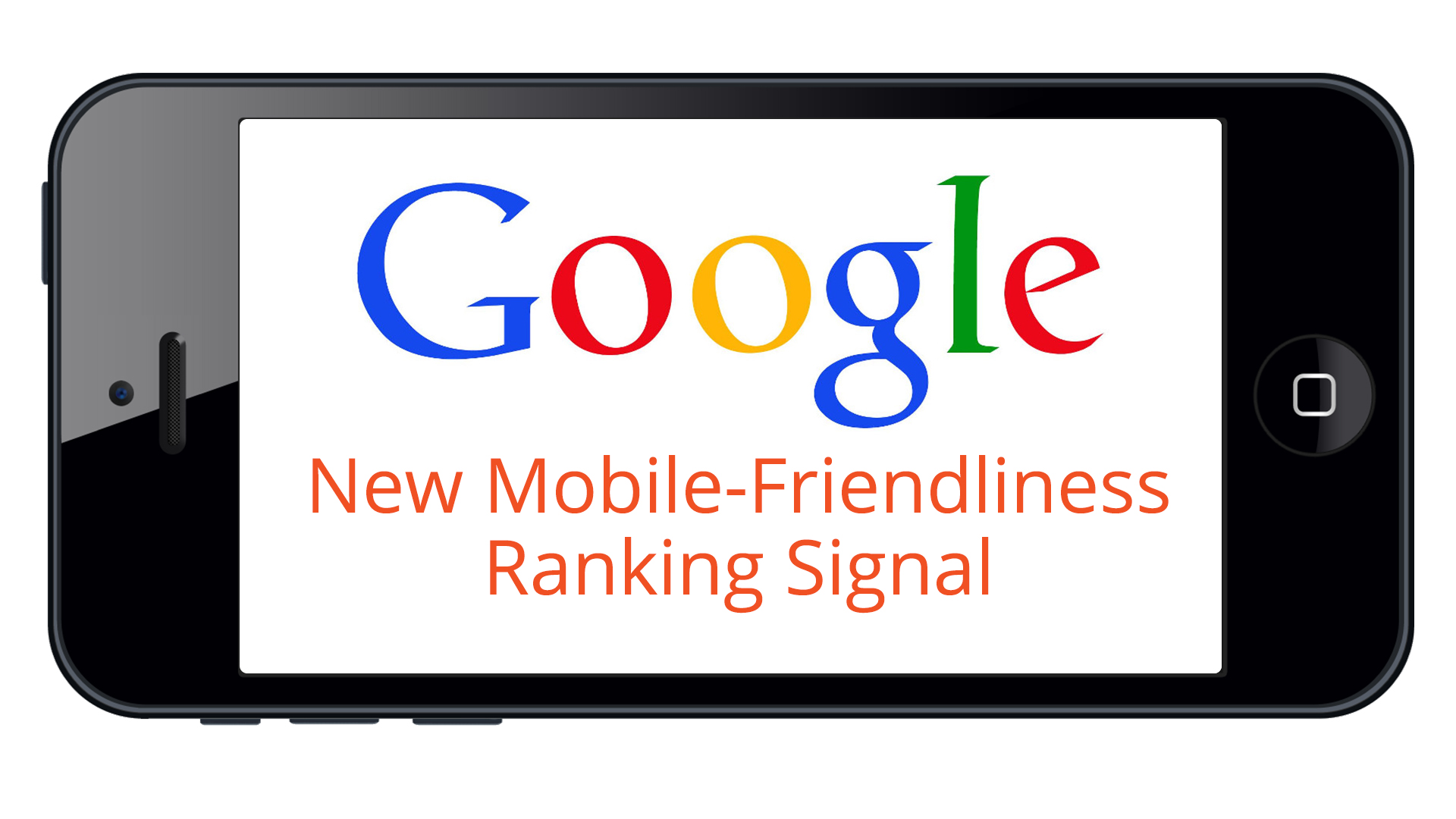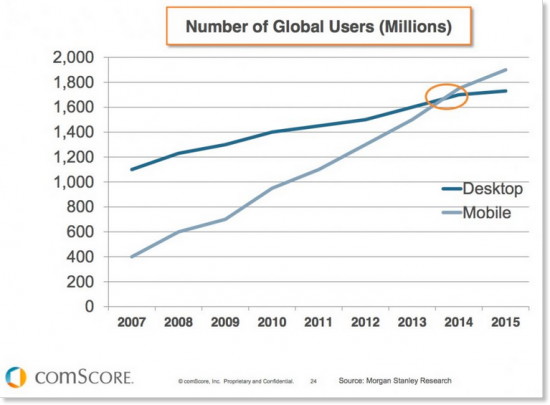If you want to rank higher in Google search results, you’ll need a mobile-optimised website. Google has announced their intentions to use mobile-friendliness as a ranking signal.
Now that mobile internet usage exceeds that of desktops, this is big news for businesses, as those who don’t have a mobile-friendly website could be left behind.

What does Google’s Mobile-Friendly Ranking Signal mean for businesses?
Google will be displaying mobile-friendly websites higher in mobile search results, in order to better serve their users. As far as the impact that search engine algorithm updates can have on a business, this is a very important one.
If your business does not have a responsive or otherwise mobile-friendly website, you could be missing out on vital website visitors and ultimately, business.
Google has said the new mobile-friendliness ranking signal will have a significant impact within mobile search results, which is great news for mobile users looking to find top website content which is optimised for the device they are using. This new change will affect mobile searches in all languages worldwide.
If you’re unsure whether your website meets the criteria for Google’s new mobile-friendly ranking boost, then you can test your website over on Google’s Mobile-Friendly Test, to see exactly how optimised your website pages are for mobile devices.
If you’re still not convinced, this report from Comscore shows just how important the mobile web is, as it has finally surpassed desktop internet usage.

Why is Google doing this now?
For a long time now, people have been speculating about Google’s intentions towards mobile search, and whether it is actually a ranking factor at all. In recent months, Google has also been toying with a “Mobile Friendly” tag for mobile users which displays whether or a not a site is optimised for their device, directly in their search listing.
They have also been sending mobile usability warnings via Google Webmaster tools, alongside launching a mobile-friendly testing tool. Google has been warming us up for this new announcement, and now they are taking the leap into ranking mobile websites much higher than their unoptimised counterparts.
However, all this debate has been put to rest by the new announcement that Google is going to be expanding the use of mobile-friendliness as a ranking signal.
The exact quote from Google, goes as follows:
Starting April 21, we will be expanding our use of mobile-friendliness as a ranking signal. This change will affect mobile searches in all languages worldwide and will have a significant impact in our search results. Consequently, users will find it easier to get relevant, high quality search results that are optimized for their devices.
What Google is essentially doing, is incentivising upgrading to a mobile-friendly website; by rewarding those who have mobile websites with higher search results rankings.
In contrast, if you don’t have a mobile friendly website, then after April the 21st, you could see a significant drop in mobile traffic; as Google may well be steering mobile users away from your website, or not listing it on mobiles at all. Despite this, it is still just a ranking signal; meaning that just because a site isn’t mobile friendly doesn’t mean it won’t appear in mobile search results. If it’s an exact match for whatever a customer searches, then it will be available to the searcher. However, if your keyword or search term is competitive and not specific to your brand, then non-mobile websites will most likely be outranked by those optimised for mobiles.
Is this Mobile-Friendliness Ranking Signal an important one?
In a further Q&A with Gary Illyes, a Webmaster Trends Analyst for Google, he stated that the mobile friendliness ranking signal will be on a page by page basis; meaning that even if most of your webpages pass the check, that does not mean your entire website will. Google will only pass those that are deemed mobile friendly.
Illyes deemed April the 21st as “a very important day”, but refrained from saying much more. He would not state whether or not there was a delay between getting a website to be mobile friendly and when it would rank accordingly, yet he did state that you should “have them ready by the 21st and it will be good.” It seems then, that the date of April 21st will be very significant indeed; even if we don’t yet know the exact details of why this is.
What is also interesting, is that he stated Google has plans to launch a completely separate mobile index further into the future; which would be pretty big news. However, this is still in development, and so there is no news surrounding this.
It’s all still rather vague and cryptic, but if this shows us anything, it’s that Google is going to be pushing for a mobile-friendly web, and optimising results for anyone searching Google on their mobile device.
What’s interesting, is that normally when Google is going to undergo a search algorithm change, they won’t say a thing until it’s done. In this case, they’re giving us an exact date, and telling us what they’re going to do. This is mainly because Google really does want us to make adjustments in order to best display our websites to mobile searchers. Additionally, Google has described the ranking change as having a “significant impact”, which is something they wouldn’t normally state. This hints at just how important this algorithm update will be.
What should I do now?
Mobile websites have long given businesses a competitive advantage, due to the huge surge in the use of mobile and tablet devices over recent years, and the fact that mobile web design means more of these visitors can be converted into leads or sales.
The next step, is that mobile-friendly websites are becoming the norm. And essentially, if you don’t have a website that is optimised for mobile devices, you are going to be left behind. Those businesses who had a website made for desktop users displayed for mobile users already risk becoming irrelevant. Any mobile user who comes across a website that is difficult to use, and an impossibility to navigate, will choose not to do business with them, and it can also damage the image of a brand if they don’t care about their customers. With this new announcement, it means that businesses will have less chance of even being displayed in mobile search results.
If your business doesn’t have a mobile-friendly website, then it is imperative you make the leap as soon as possible.
What type of Mobile Web Design should I go for?
Google has already pledged their support for responsive web design, which means the website will respond to whatever device is viewed on, optimising it for any sized device from smartphone, to tablet, to desktop PC.

Google has expressed their belief that responsive web design results in less errors than dedicated mobile websites, and that responsive design provides the best possible user experience. In the future, I would not be surprised if Google put their weight behind this design even more, and use responsive web design as a ranking factor in itself, prioritised over dedicated, separate mobile websites.
If you are looking to redesign or update your website with a modern, mobile-friendly, responsive web design, then get in touch here with the team at Xanthos.
We build fully responsive mobile-friendly websites, which deliver results and give you a real return on your investment. If you’d like to see our work, check out our portfolio.












